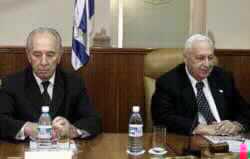Responding to powerful U.S. pressure, Israel began withdrawing its forces from Yasser Arafat's compound in Ramallah on Sunday, but said it would continue its 11-day hunt for wanted Palestinians inside from a distance, a senior Israeli official said. Shortly after the decision was announced Sunday morning, the Israeli flag was pulled down from one of the few buildings still standing in the devastated compound. Occupation troops began to remove occupation army vehicles, coils of unused barbed wire and lighting equipment from the compound.
occupation soldiers who had taken over apartment buildings overlooking the compound began to leave their positions, tossing sandbags, which had been mounted on rooftops, to the ground.
A spokesman for Arafat - who remains holed up with some 200 people in the main building - said the decision did not go far enough and the siege should end fully, in compliance with Tuesday's U.N. Security Council resolution.
"Israel is trying to skirt the (Security Council) decision by misleading the public opinion when talking about a withdrawal from the compound, while at the same time maintaining the siege around Arafat and the compound," said Nabil Abu Rdeneh.
A U.S. Embassy official in Tel Aviv, speaking on condition of anonymity, said that if it emerged that the siege was not over the United States position would be the same as before - that it must end.
"The siege around Arafat will be lifted, but the wanted suspects will continue to be wanted suspects," said Israeli Tourism Minister Yitzhak Levy said as he left a Cabinet meeting.
"I don't have any doubt that when a suspect tries to leave, he will be caught by Israeli troops," Levy added.
Israeli politicians from both the left and the right called the decision a surrender that reflected a planning and operational failure. Many have argued that the operation has only strengthened Arafat at a time when he had been facing growing internal pressure to reform his government and cede some powers.
Israel's military "will withdraw from the vicinity of (Arafat's compound) and redeploy such that it will be possible to ensure that wanted resistance mans will not leave freely," said the government decision, quoted by the official, who spoke on condition of anonymity.
It was not clear exactly how far away the occupation troops would move; the official said the military was expected to hand in a detailed pullout plan in coming hours and that it would be implemented by evening or nightfall.
Israeli attacked Arafat's compound on Sept. 19 - after a resistance bombing on a bus in Tel Aviv by the Hamas activist group that killed six Israelis - ringing it with occupation troops and armor. It destroyed several buildings with massive bulldozers and demanded Arafat turn over the people inside, saying many were resistance mans.
The Security Council condemned the operation and demanded it end, and President Bush also criticized it as unhelpful. According to Israeli media reports, U.S. National Security Adviser Condoleeza Rice demanded that the siege end at a weekend meeting in Washington with top Sharon aide Dov Weisglass.
The Israeli government decision noted "the deep friendship between Israel and the United States" and promised "to do everything ... to enhance the strategic cooperation and relations."
Israel says those who are not on the wanted list of several dozen will be allowed to go home. Israel also says Arafat himself is free to leave at any time and can go wherever he wishes - although officials have suggested he may not be allowed to return.
Defense Minister Binyamin Ben-Eliezer has proposed that the wanted Palestinians be exiled to other countries, like several dozen activists who were besieged by Israeli occupation soldiers at the Church of the Nativity in Bethlehem five months ago.
Yossi Sarid, Israel's dovish opposition leader, welcomed Sunday's decision but added that it amounted to a capitulation by "a foolish government that can't see two steps ahead." And hawkish legislator Avigdor Lieberman concurred that a protracted siege was a mistake, adding that the timing interfered with the U.S. efforts on Iraq.
Some of the Palestinian side saw the decision as a victory.
"The decision by President Arafat and his aides to remain steadfast was the reason for this decision," said Palestinian Cabinet Secretary Ahmed Abdel Rahman. "It's possible to change positions and facts on the ground through this steadfastness."
Israel has accused Arafat of doing nothing to end 'resistance' attacks by activist groups against its civilians, and even providing tacit encouragement. But the Palestinians argue that Israel's travel restrictions in the West Bank and Gaza and its military strikes have rendered their security services powerless.
PHOTO CAPTION
Israeli Prime Minister Ariel Sharon, right, and Foreign Minister Shimon Peres, left, pause during a cabinet meeting in Sharon's Jerusalem office Sunday Sept. 29, 2002. The Israeli government decided Sunday to withdraw its forces from inside Yasser Arafat's compound, but the siege will continue from a short distance away. (AP Photo/Gil Cohen Magen, POO
- Author:
& News Agencies - Section:
WORLD HEADLINES


 Home
Home Discover Islam
Discover Islam Quran Recitations
Quran Recitations Lectures
Lectures
 Fatwa
Fatwa Articles
Articles Fiqh
Fiqh E-Books
E-Books Boys & Girls
Boys & Girls  Hajj Rulings
Hajj Rulings Hajj Fatwas
Hajj Fatwas














